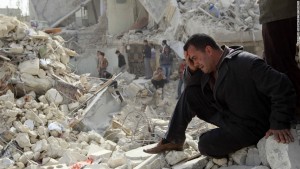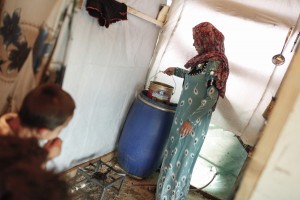Displaying items by tag: Syria
Syria's Civil War Explained
The Syrian civil war is the deadliest conflict the 21st century has witnessed thus far.
- “Five years since the conflict began, more than 450,000 Syrians have been killed in the fighting, more than a million injured and over 12 million Syrians - half the country's prewar population - have been displaced from their homes.
What caused the uprising?
Initially, lack of freedoms and economic woes fuelled resentment of the Syrian government, and public anger was inflamed by the harsh crackdown on protesters. Successful uprisings in Tunisia and Egypt energised and gave hope to Syrian pro-democracy activists. Many Islamist movements were also strongly opposed to the Assads' rule. In 1982, Bashar al-Assad's father, Hafez, ordered a military crackdown on the Muslim Brotherhood in Hama, which killed between 10,000-40,000 people and flattened much of the city…
A severe drought plagued Syria from 2007-10, spurring as many as 1.5 million people to migrate from the countryside into cities, which exacerbated poverty and social unrest. Although the initial protests were mostly non-sectarian, armed conflict led to the emergence of starker sectarian divisions. Minority religious groups tend to support the Assad government, while the overwhelming majority of opposition fighters are Sunni Muslims. Although most Syrians are Sunni Muslims, Syria's security establishment has long been dominated by members of the Alawite sect, of which Assad is a member. The sectarian split is reflected among regional actors' stances as well. The governments of majority-Shia Iran and Iraq support Assad, as does Lebanon-based Hezbollah ; while Sunni-majority states including Turkey, Qatar, Saudi Arabia and others staunchly support the rebels…
The situation today
On November 26, the Syrian army launched a military offensive on Aleppo . In less than a month, Syrian troops, with unfettered Russian air support, were able to recapture 90 percent of the eastern part of Aleppo.
On December 13, the Syrian army claimed that 98 percent of east Aleppo was in the hands of Syrian government forces.
Besides, Aleppo, the Syrian government currently controls the capital, Damascus, parts of southern Syria and Deir Az Zor, much of the area near the Syrian-Lebanese border, and the northwestern coastal region. Rebel groups, ISIL, and Kurdish forces control the rest of the country.
Rebel groups continue to jockey against one another for power, and frequently fight each other. The Free Syrian Army has weakened as the war has progressed, while explicitly Islamist groups, such as the al-Nusra Front, that has pledged allegiance to al-Qaeda , became empowered. Last July, al-Nusra front leader, Abu Mohammed al-Jolani, announced his group's name has also changed to Jabhat Fateh al Sham, or The Front for liberation of al Sham.
In 2013, ISIL emerged in northern and eastern Syria after overrunning large portions of Iraq. The group quickly gained international notoriety for its brutal executions and its energetic use of social media. Meanwhile, Kurdish groups in northern Syria are seeking self-rule in areas under their control. This has alarmed Turkey's government, which fears its large native Kurdish population may grow more restive and demand greater autonomy as a result. Last August, Turkish troops and special forces, backed by the Free Syria Army, launched operation "Euphrates Shield" against ISIL to liberate the strategic Syrian city of Jarablus on the border with Turkey. Euphrates Shield operation is considered to be the first Turkish ground intervention in Syria since the Syrian crisis started in 2011.
The Syrian war is creating profound effects far beyond the country's borders. Lebanon, Turkey, and Jordan are now housing large and growing numbers of Syrian refugees, many of whom have attempted to journey onwards to Europe in search of better conditions. Fighting has occasionally spilled over from Syria into Lebanon, contributing to the country's political polarisation. Several rounds of peace talks have failed to stop the fighting. But with much of the country in ruins , millions of Syrians having fled abroad, and a population deeply traumatised by war, one thing is certain: Rebuilding Syria after the war ends will be a lengthy, extremely difficult process.”
Please keep Syria and this ongoing conflict in your prayers. Let’s pray for His peace to come soon after seven years of fruitless fighting that has wrought so much destruction on this land and its people.
Syria: peace talks under way
UN-sponsored peace talks between the Syrian government and opposition began in Geneva on Thursday. The two sides will not meet face-to-face to begin with. Staffan de Mistura, the UN's special Syria envoy, said on Wednesday he was ‘not expecting a breakthrough’, though we can pray for one. The opposition insists that the fate of President Bashar al-Assad must be on the agenda, but the government refuses to discuss this. For the sake of the 300,000+ people killed since the war began, the 4.8m who have fled the country and 6.3m displaced inside Syria, ask God in His mercy to be in the midst of these negotiations and for His will to be done on earth as it is in Heaven.
Syria: report on prison hangings denied
Syria's justice ministry has rejected a report by Amnesty International that alleged as many as 13,000 people have been executed at a government prison. The ministry said the claims were ‘completely untrue and intended to harm Syria's reputation’. Amnesty said mass hangings took place every week at Saydnaya prison between September 2011 and December 2015, and that the executions had been authorised at the highest levels of the Syrian government. 84 people, including former guards, detainees, and prison officials, were interviewed for the report. In a statement carried by the official Sana news agency, the justice ministry dismissed the claims as ‘baseless’ and said that all executions in Syria followed due process. Last year UN human rights experts said witness accounts and other evidence strongly suggested that tens of thousands of people were being detained, and that ‘deaths on a massive scale’ were occurring in custody.
Disturbing Geopolitical Situations for Watching over in Prayer
Thanks to Robert Maginnis who maintains a vigilant watch over world security issues, here are some serious, worrying situations that intercessors need to keep on the front-burner of our hearts in intercession. They come from his IRAQ-SYRIA UPDATE during this last month of January. Please do read and pray through these potential and developing threats to the security and peace of our world. The prayers of many provide a spiritual shield of protection over the nations:
Nuclear War Danger
Doomsday Clock advances closer to midnight. The New York Times reports the Bulletin of the Atomic Scientists on Thursday moved the clock 30 seconds closer to midnight. It attributes that change to the global security landscape and especially to President Trump’s statements and actions it labels “unsettling.” Specifically, the report sites Mr. Trump’s comments about expanding and even deploying the American nuclear arsenal and his alleged “propensity to discount or reject expert advice related to international security.”[i] Note: I’m not surprised by the Times’ echoing this observation because it fits the paper’s anti-Trump agenda. Fact is the clock can be moved closer to midnight because North Korea is on the cusp of having a credible nuclear-tipped ballistic missile; Iran continues to pursue a similar capability; China continues to invest in survivable nuclear systems and Russia, our primary nuclear adversary, has poured billions into new ballistic missiles systems and modernizing the world’s largest atomic arsenal. Mr. Trump, unlike Obama, is not putting his head in the sand. The world is far more dangerous today than any time sense the end of the Cold War and Mr. Trump sees this and intends to close the gap to make America safer.
China
Chinese warn Trump not to end one China policy. Reuters reports the state-run tabloid Global Times warned Mr. Trump that Beijing would “take revenge” if the new president reneges on the one-China policy. Evidently Taiwan President Tsai Ing-wen met with senior U.S. Republican lawmakers during her stopover in Houston on Sunday en route to Central America. China had asked the U.S. not to allow Tsai to enter or have formal government meetings under the one China policy. Beijing considers self-governing Taiwan a renegade province ineligible for state-to-state relations.[i] Note: Count on Beijing to quickly test the new president’s mettle either in the South China Sea or vis-à-vis North Korea.
Trump’s State nominee’s confirmation statement earns Chinese warning of war with the U.S. The London Telegraph reports blocking Chinese access to islands in the South China Sea would require the U.S. to “wage war,” a Chinese state-run paper said on Friday in the wake of testimony by Mr. Trump’s nominee for Secretary of State suggested such a strategy. The escalation in harsh rhetoric comes after Beijing warned the president-elect not to welcome engagement with Taiwan’s leader, Tsai Ing-Wen. Rex Tillerson, Mr. Trump’s nominee for State, told his confirmation hearing that he wanted to send a signal to China that their access to islands in the disputed South China Sea “is not going to be allowed.” He continued that the U.S. would have to “wage a large-scale war” in the South China Sea to prevent Chinese access to the Islands.[ii] Note: I predict in Future War that the next major world war will take place in the Asia arena and it will involve both the U.S. and China either as adversaries or parties that seek to find accommodation to prevent the spread of hostilities.
North Korea
Trump threatens to down North Korean ICBM. The Military Times reports President-elect Trump will face a defiant North Korea early in his administration. North Korea is talking about launching a newly perfected intercontinental ballistic missile and unnamed U.S. officials in Washington indicate that if Pyongyang launches a missile that threatens American territory it will be shot down. The exchange in the news suggests Pyongyang and the incoming U.S. administration are feeling each other out ahead of the 20 January inauguration. What’s not in question is the fact the North Koreans have nuclear weapons and a growing ballistic missile capability. However, there is question among intelligence officials whether Pyongyang has mastered miniaturizing nuclear warheads to fit atop ballistic missiles.[iii]
Trump foreign policy crisis on front burner: Pyongyang likely has enough for 10 plutonium bombs. North Korea is believed to have some 50 kg of weapons-grade plutonium, or enough to make 10 nuclear bombs, according to the South Korean Defense Ministry’s 2016 defense white paper, which was released Jan. 11, Yonhap reported. Seoul’s last defense white paper, released at the end of 2014, estimated that the North had around 40 kg of plutonium. Pyongyang has also made significant advancements in its ability to miniaturize a nuclear warhead, as well as its ability to enrich uranium, according to the paper.[i] Note: The regime also has enriched uranium, ballistic missiles and miniaturized warhead technology. Expect Mr. Trump to face a crisis with Pyongyang early in his administration.
Middle East
Iraqi forces gain more ground in eastern Mosul. Reuters reports Iraqi special forces made more advances against ISIS in Mosul, pushing the jihadi from another eastern district and edging closer to the city center. Meanwhile, Mosul residents trickled out of the hot zone while others returned to their homes as their areas were retaken from ISIS. ISIS jihadists have fought fiercely with car bombs, snipers operating from a network of tunnels embedded in Mosul’s civil population. The battle will likely continue for months in spite of recent progress.[vi]
2016 bloody year for Iraq. The Washington Post reports violence and military operations in Iraq last year claimed 16,000 civilian lives, making it one of the deadliest years since the 2003 U.S.-led invasion. A report by the London-based Iraq Body Count reported that 16,361 Iraqi civilians died in 2016 and a plurality were killed in the province of Nineveh, the home of Mosul which was captured in 2014 by ISIS.[iii]
Syrian dictator ready to talk. Reuters reports even though the truce brokered by Russia and Turkey is showing significant strains, Syrian President Bashar al-Assad claims he is ready to negotiate on “everything” at peace talks his Russian allies hope to convene in Kazakhstan, including his own position within the framework of the Syrian constitution. However, Assad insisted any new constitution must be put to a referendum and it was up to Syrians to elect their president.[viii]
Syrian rebels participate in Russian, Turkish-backed peace talks in Kazakhstan. Reuters reports Syrian rebel groups will attend peace talks backed by Russia and Turkey in Kazakhstan. Moscow set the diplomatic effort in motion after Syrian rebels suffered a major defeat at the hands of regime forces. The U.S., which led failed efforts to launch peace talks last year, has not been involved in the latest peace effort.[vii]
Iran ready to receive fresh shipment of natural uranium. Iran is preparing to receive a reported 116 metric tons of natural uranium from Russia as compensation for exports of heavy water, anonymous diplomats with knowledge of the upcoming shipment said, AP reported Jan. 9. The United States and five other major powers that reached a nuclear deal with Iran in 2015 agreed to the shipment, the first since the historic accord came into effect, according to the diplomats. Though Tehran has not explicitly outlined its plans for the delivery, the International Atomic Energy Agency will monitor any natural uranium shipments to Iran for 25 years after the start of the deal.[ix]
South Asia
Pakistan test-fired first submarine-launched cruise missile. Pakistan's military test-fired the country's first submarine-launched cruise missile on Jan. 9, Reuters reported. With a reported range of 450 kilometers (280 miles), the Babur-3 missile represents a credible second-strike capability for Pakistan, a statement from the Pakistani military said. Test-firing the nuclear-capable missile is likely to ramp up tensions with neighboring India; the two adversaries are locked in a years-long arms race in which each country views military advances by the other as a direct threat to its security.[xi]
Trump faces a central Asia conflict; India, Pakistan neck-and-neck in nuclear race. The nuclear race between India and Pakistan is intensifying, thanks in large part to Islamabad's fear that its military is starting to lag behind New Delhi's. Over the past decade, Pakistan has become alarmed by the widening gap between its ability to wage conventional war and India's. Pakistan has turned to its nuclear inventory to level the playing field. But in doing so, Islamabad has spurred its nuclear competition with New Delhi forward even faster, a rivalry that culminated in Pakistan's Jan. 9 test-fire of the Babur-3 submarine-launched cruise missile. The test of the sea-based nuclear-capable weapon was the first of its kind in Pakistan, underscoring the country's investment in mitigating the threat looming on its eastern border. But as Islamabad takes steps to bolster its nuclear deterrent, New Delhi will almost certainly follow suit, each state engaging in a dangerous contest to stay one step ahead of the other. Warning: Pakistan’s decision to rely on nuclear weapons to deter India increases the likelihood of nuclear war in South Asia. Pakistan’s recent sea-based nuclear test demonstrates an alarming pattern of posturing between the two nuclear powers.
Pakistan’s North Waziristan “Epicenter” of global terrorism. The Voice of America reports the US commander of international forces in Afghanistan recently visited Pakistan’s North Waziristan which many experts condemn as the “epicenter” of global terrorism. General John Nicholson, commander of NATO’s Resolute Support mission on counterterrorism operations, visited the Pakistan region as part of his effort to work with Pakistan’s military chief, General Qamar Javed Bajwa, who promised cooperation to target al-Qaeda, the Taliban and the Haqqani Network which operate in the region.[vii]
Taliban kill more than 30 in Kabul. Reuters reports a Taliban suicide attack near the Afghan parliament in Kabul killed at least 33 people and wounded another 70. The Taliban spokesman said “We planned this attack for quite some time and the plan was target some senior officers of the intelligence agency. We sent one suicide bomber to target a minibus that was carrying these officers,” the spokesman said.[viii]
Taliban buy American arms from Afghan ally. The Washington Free Beacon reports Taliban jihadi in Afghanistan have been purchasing U.S.-supplied weapons and ammunition from Afghan army and police forces. A U.S. government report indicates just 63% of Afghanistan is under allied control, despite billions in military aid and meanwhile that country is experiencing an increase in violence. Evidently, according to the report, Afghan security forces are selling their American-supplied weapons to their Taliban enemies.[viii]
Russia
Trump’s State and Defense nominees speak frankly about Russian threat. The Guardian reports that Trump’s defense nominee retired Gen. James Mattis said at his confirmation hearing the West should recognize the reality that Russian President Putin is trying to break NATO and Trump’s State nominee, Mr. Rex Tillerson, described Russia’s annexation of Crimea “as an act of force” and said that when Russia flexed its muscles, the U.S. must mount “a proportional show of force.” Of course in response to Russian aggression in Eastern Europe the U.S. and NATO allies have steadily increased air patrols and training exercises across the region. At this time troops from the Third Armor Brigade Combat Team, 4thInfantry Division, based in Fort Carson, Colorado, are moving from the U.S. to Germany and then railing to Poland with their 87 tanks and 144 other armored vehicles. This move has the Russians’ attention and drew their criticism.[i] Note: The Obama administration began its eight year run with a Russian reset. It would appear the Trump administration is setting the stage for a serious re-evaluation of our relationship with Russia that at this point appears more confrontational.
Robert Maginnis, This email address is being protected from spambots. You need JavaScript enabled to view it.
Syria and Iraq
The Christian communities of Syria and Iraq are in the middle of a ‘cataclysmic crisis’, a report warns. Their very existence is in peril, as the world witnesses one of the greatest threats to the Church in the Middle East since its birth over 2,000 years ago. Christians are facing targeted persecution and leaving Syria and Iraq at an increasing rate. If this rate of emigration continues, within a few years the Christian communities in these countries will be utterly devastated. The report warns that war in Syria and Iraq has ‘unleashed a tidal wave of violent persecution’, which has targeted the highly vulnerable Christian population and has dramatically accelerated the flight of Christians from Iraq and Syria. Before 2011, Syrian Christians numbered about eight per cent of the population of 22 million: today about half are believed to have left the country. Before 2003, there were around 1.5 million Christians in Iraq, less than five per cent of the population: now, estimates hover between 200,000 and 250,000. Those who have left often have no hope or expectation of return.
Middle East: the year ahead
2017 is set to be fraught with challenges for the people of the Middle East, Christian and Muslim alike. A brief summary: 1) Iraq will remain precarious, even though the battle to retake Mosul is making progress: Shiite-dominated rulers in Baghdad face conflict with an unwilling Sunni minority. 2) Turkey’s stability is threatened by challenges from IS and from Kurdish militants, who have killed some 1,000 Turkish soldiers in the last two years. 3) There are hopeful signs in Iran, though changes could be slowed by the death of former President Rafsanjani and the expectation of more hostile US policies under Donald Trump. The poor health of supreme leader Ali Khamenei might mean a potential leadership change soon, which could have serious implications for the entire region. 4) The mood in Syria seems to be turning towards a ceasefire and acceptance of Assad staying on as president, at least in the short term. 5) Egypt is expected to see new protests and tensions with continued terrorism, and the economy will remain the number one challenge. The whole region remains in much need of continuing prayer: yet every challenging phase is also a chance for Christians to rise up as salt and light, and to offer reconciliation and restoration where they are desperately needed.
Syrian car bomb kills at least 11
A car bomb attack has killed at least 11 civilians in Jableh, a government-held coastal town. Thirty-five others were also injured by the blast in a commercial area crowded with people near the municipal stadium, a news agency said. There was no immediate claim of responsibility for the bombing. Last May, 45 people died in the town in attacks claimed by IS that targeted President Bashar al-Assad's minority Alawite sect. Footage from the scene of Thursday's attack broadcast by state television showed charred, mangled cars, damage to shops, and pools of blood on the road. The Syrian Observatory for Human Rights, a UK-based monitoring group, put the death toll at 15. See also:
Jesus appears to Syrian refugees
Marvin Lahoud, a 26 year-old volunteer with a Lebanese church serving Syrian refugees, was in charge of food voucher distribution. On this day, Marvin discovered that one of the refugee families returned to Syria leaving him with an extra voucher to distribute to another family.
He scanned the wait list. The first family he called—also returned to Syria. The second family didn’t answer the phone. Further constraints led Marvin to dismiss the third and fourth families from the wait list. Marvin finally decided to make his way over to the house of the fifth family.
A little boy stood at the entrance of the basement space his family called home, looked up at Marvin, and smiled. Matter-of-factly the Syrian boy said, “Come in. We were expecting you.”
Marvin looked at him—puzzled. He hadn’t told anyone he was coming; much less contacted the Muslim Syrian refugee family. How could they have known he was coming?
The young Syrian boy’s mother beckoned Marvin into their home and asked the boy to explain.
“Yesterday”, the little boy said, “I had a dream that was so vivid I thought it was real. I was walking on the shore of the sea and saw a man standing in the sea with water up to his knees. He was clothed in a bright white robe. His face shined so bright, I couldn’t see the details of his face. His hands were noticeably tender. I asked him who he was. He said, ‘I am Jesus.’ I said, ‘What do you want?’ Jesus said, ‘I want you to believe in love, have faith and keep hope.’ And Jesus continued to say, ‘Do not be afraid. Help is on the way. Tomorrow, a man will come over called Marvin and he will help you and your family.’”
And now you are here, said the mother to Marvin.
Source: Providence Magazine
Photo Credit: Rawaa, 21, a mother of three from Aleppo, draws water from a storage tank in her tent at an informal tented settlement for Syrian refugees in the Bekaa Valley, Lebanon, in July 2014. Photo by Sam Tarling for Norwegian Relief Council, posted by Directorate-General for European Civil Protection and Humanitarian Aid Operations (ECHO), via Flickr.
Syrian Ceasefire and Possible Peace Talks Need Our Prayers
Fox News, Dec. 29
“The major players involved in the long-running Syrian conflict have agreed to a cease-fire set to begin at midnight on Thursday, Russian President Vladimir Putin said earlier in the day.
The deal will be guaranteed by Russia and Turkey. It's set to be followed by peace talks between Syrian President Bashar Assad's government and opposition leaders. The Syrian parties would meet in Kazakhstan for the talks, though no date has been set.
Some terror groups are to be excluded from the cease-fire, though, aside from ISIS, it's unclear which -- if any -- that refers to. The head of rebel group Fastaqim told Reuters the truce only excluded ISIS. The Syrian army earlier said the agreement would exclude ISIS, the group formerly known as the Nusra Front and any group linked to it.
Ahmad Ramadan of the Syrian National Coalition said the truce reached Thursday includes a halt to airstrikes and shelling.
Ramadan said in text messages sent to The Associated Press that members of the Free Syrian Army, a loose alliance of several moderate rebel factions, will abide by the truce -- but retaliate to violations by government and allied forces.
Russian Defense Minister Sergei Shoigu said the truce will include 62,000 opposition fighters across Syria, and that the Russian military has established a hotline with its Turkish counterpart to monitor compliance.
Foreign Minister Sergey Lavrov said President-elect Donald Trump's administration would be welcome to join the Syrian peace process once he takes office.
Russia is a key ally of Assad, while Turkey is one of the main backers of the opposition. Several previous attempts to halt the civil war have failed.
Let’s pray for the ceasefire to hold and be observed by all parties and that these peace talks can go ahead and bring an end to this destructive conflict.
The Fall of Aleppo
December 13, 2016
I sit in safety, less than one hour by air, only a few hundred miles from the besieged city of Aleppo that today has finally fallen to the forces of the Assad regime. I hear the cries of the innocent who wait for death even as they race to find a place of safety, a way out of the inferno of madness that is war. Their cries echo through the fractures of my breaking heart, tears fall and I grieve for the unjustifiable loss of life, for the children, for the men and women who will not see tomorrow. In the wrong place at the wrong time, some are simply civilians whose crime was that they lived in a rebel enclave. Others - aid workers, rescuers who sought to save and heal, remain alongside activists for freedom – all trapped together under the threat of indiscriminate armaments roaring over their heads, exploding in their streets. War, its strategies of conquest and death, its madness and sophisticated violence, its use of ever stronger force blindly focused to eradicate all resistance whatever the cost.
The world watches, waits for the aftermath when the last enclave falls. Breaking news informs of reprisal, the inevitable massacre has begun. The execution count unashamedly includes tens of women and children, all of them deemed enemies.
Helpless to help, I can but weep and plead for mercy
The Fall of Aleppo
We close our eyes
and think because
we cannot see the darkness
it is not our own.
War in real time,
voices emerge from the rubble,
disembodied cries rise amidst the ruins.
From under mounds of wreckage
telephones still beep their signals
to an anesthetized world.
Death-rattles tweet
into the hollow bright realm
of supercomputers,
thought-fast communications.
Their android voices twitter
through labyrinthine cyber-nets,
crossing continents
at the speed of light,
disseminating darkness
as multitudes fall, swallowed
in the maw of today’s real time war.
Lisa Loden ©
December 13, 2016








